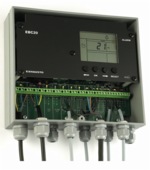New controller for chimney automation systems

Efficient and safe boiler operation under all weather conditions is provided by Exhausto’s new controller for its chimney automation systems.
Exhausto has developed a more versatile electronic controller for its chimney automation systems and mechanical combustion-air supply systems. The EBC20 controller ensures that the draught in a flue system is constantly correct to achieve maximum fuel efficiency and safety, regardless of how many boilers are connected to the flue or external weather or environmental conditions. Adverse weather can have a dramatic effect on flue efficiency — and, hence, fuel consumption. This chimney automation system eliminates these problems by accurately matching the flue draught to requirements at all times. If boilers are changed without the flue system being altered, the controller can be reprogrammed to provide the ideal draught to achieve maximum efficiency. Matching the speed of the fan to requirements also significantly reduces its running costs compared with a fixed-speed fan. Exhausto chimney automation systems can often enable smaller flues to be used. In many cases, the reduced building cost can pay for the system. An important feature of a chimney automation system is to eliminate spillages of carbon monoxide into the boiler room and neighbouring areas. The EBC20 controller can be used with boilers using gas, oil or solid fuel. It can also be used to control the supply of fresh air into the boiler room.
Related links:


